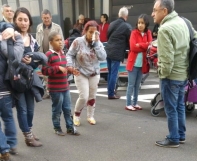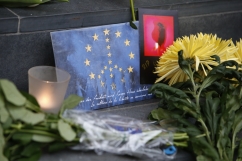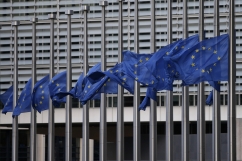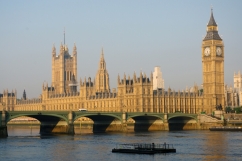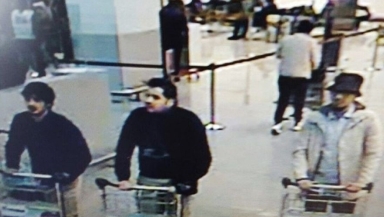
Belgian police identified two suspected Islamic State suicide bombers captured on security cameras before they struck Brussels Airport on Tuesday in the first of two attacks that also hit the city's metro, public broadcaster RTBF said on Wednesday.
The death toll in the attacks on the Belgian capital, home to the European Union institutions and NATO, rose to at least 31 with more than 200 wounded, Health Minister Maggie De Block said on VRT television.
The Syrian-based Islamist militant group claimed responsibility four days after the arrest in Brussels of a prime suspect in November's Paris attacks. If confirmed, the identifications would link the Brussels blasts directly to the jailed Paris suspect, Salah Abdeslam.
The attacks sent shockwaves across Europe and around the world, with authorities racing to review security at airports and on public transport, and rekindled debate about European security cooperation and police methods.
RTBF, quoting a police source, named the suspected bombers as Khalid and Brahim El Bakraoui, two brothers resident in Brussels and known to the security services for crime.
The newspaper DH said a third suspect seen with them before running away from the airport after the blasts was identified as Najim Laachraoui, 25, a man sought by police and directly linked to Abdeslam.
Khalid had rented under a false name the apartment in the city's Forest borough, where police hunting Abdeslam killed a gunman in a raid last week, RTBF said.
The Brussels blasts fueled political debate across the globe about how to combat militants.
"We can and we will defeat those who threaten the safety and security of people all around the world," said U.S. President Barack Obama.
Donald Trump, the front-runner for the Republican nomination to succeed Obama in November's U.S. election, suggested suspects could be tortured to avert such attacks.
Brussels police searched a house in the north of the city late into the night, turning up another bomb, an Islamic State flag and bomb-making chemicals in an apartment in the borough of Schaerbeek.
Local media said authorities had followed a tip from a taxi driver who may have driven the bombers to the airport.
Investigators said they were focusing on a man in a hat who was caught on CCTV pushing a laden baggage trolley at the airport with two others they believed were the bombers. An unused explosive device was later found at the airport and the man, believed to be Laachraoui, was seen running away from the terminal after the explosions.
Closing in
Security experts believed the blasts, which killed about 20 people on a metro train running through the area that houses EU institutions, were probably in preparation before Friday's arrest of locally based French national Abdeslam, 26, whom prosecutors accuse of a key role in the Nov. 13 Paris attacks.
He was caught and has been speaking to investigators after a shootout at an apartment in the south of the city a week ago, after which another Islamic State flag and explosives were ound. It was unclear whether he had knowledge of the new attack or whether accomplices may have feared police were closing in.
Islamic State said in a statement that "caliphate soldiers, strapped with suicide vests and carrying explosive devices and machineguns" struck Zaventem airport and Maelbeek metro station.
It was not clear, however, that the attackers used vests. The suspects were photographed pushing bags on trolleys, and witnesses said many of the airport dead and wounded were hit mostly in the legs, possibly indicating blasts at floor level.
Officials said the final death tolls remained uncertain from the carnage in the morning rush hour, around 8 am at the airport and shortly after 9 a.m. on the metro.
"A photograph of three male suspects was taken at Zaventem. Two of them seem to have committed suicide attacks. The third, wearing a light-colored jacket and a hat, is actively being sought," prosecutor Frederic Van Lee uw told a news conference.
The two men in dark clothes wore gloves on their left hands only. One security expert speculated they might have concealed detonators. The man in the hat was not wearing any gloves.
"If you recognise this individual or if you have information on this attack, please contact the investigators," a police wanted notice for the third man read. "Discretion assured."
Islamic State warned of "black days" for those fighting it in Syria and Iraq. Belgian warplanes have joined the coalition in the Middle East, but Brussels has long been a center of Islamist militancy.

About 300 Belgians are estimated to have fought with Islamists in Syria, making the country of 11 million the leading European exporter of foreign fighters and a focus of concern in France and other neighbors over its security capabilities.
"What we had feared has come to pass," said Belgian Prime Minister Charles Michel, vowing to face down the threat.
On Wednesday, he will host a prearranged visit by French Premier Manuel Valls, who declared: "We are at war."
Reviving arguments over Belgian policies following the Paris attacks, in which 130 people were killed in an operation apparently organized from Brussels, French Finance Minister Michel Sapin spoke of "naiveté" on the part of "certain leaders" in holding back from security crackdowns on Muslim communities.
Belgian Foreign Minister Didier Reynders retorted that each country should look to its own social problems, saying that France too had rough high-rise suburbs in which militants had become radicalized.
Life began to return to normal in Brussels on Wednesday, with some public transport working and cars returning to the European district, but the metro system remained closed and the airport was still shut to travelers.










